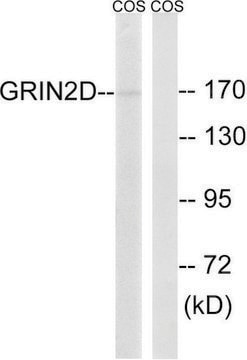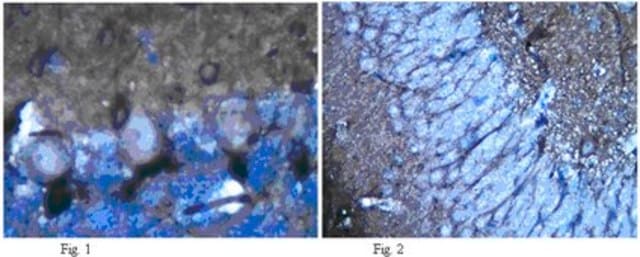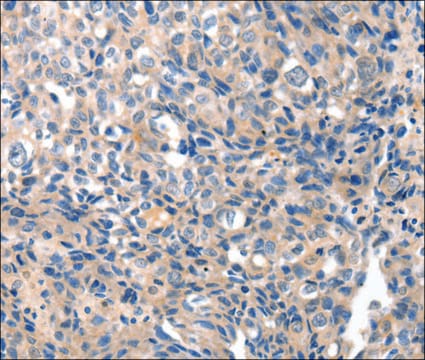MAB5578
Anti-NMDAR2D Antibody
ascites fluid, clone 1G9.39A5, Chemicon®
Zaloguj sięWyświetlanie cen organizacyjnych i kontraktowych
About This Item
Kod UNSPSC:
12352203
eCl@ss:
32160702
NACRES:
NA.41
Polecane produkty
pochodzenie biologiczne
mouse
Poziom jakości
forma przeciwciała
ascites fluid
klon
1G9.39A5, monoclonal
reaktywność gatunkowa
human, mouse, rat, rabbit
producent / nazwa handlowa
Chemicon®
metody
western blot: suitable
izotyp
IgG2b
numer dostępu NCBI
numer dostępu UniProt
Warunki transportu
dry ice
docelowa modyfikacja potranslacyjna
unmodified
informacje o genach
human ... GRIN2D(2906)
Powiązane kategorie
Specyficzność
NMDAR2D, C-terminal. By Western blot the antibody reacts with a weak band at ~145. An additional band at ~75 kDa may be seen depending on sample and antibody concentration used.
Immunogen
Recombinant protein from rat NMDAR2D.
Zastosowanie
Anti-NMDAR2D Antibody detects level of NMDAR2D & has been published & validated for use in WB.
Research Category
Neuroscience
Neuroscience
Research Sub Category
Neurotransmitters & Receptors
Neurotransmitters & Receptors
Western blot: 1:500-1:1,000 on rat brain lysate.
Optimal working dilutions must be determined by end user.
Optimal working dilutions must be determined by end user.
Postać fizyczna
Liquid.
Przechowywanie i stabilność
Maintain at -20°C in undiluted aliquots for up to 6 months after date of receipt. Avoid repeated freeze/thaw cycles.
Komentarz do analizy
Control
Rat forebrain or cerebellum.
Rat forebrain or cerebellum.
Informacje prawne
CHEMICON is a registered trademark of Merck KGaA, Darmstadt, Germany
Oświadczenie o zrzeczeniu się odpowiedzialności
Unless otherwise stated in our catalog or other company documentation accompanying the product(s), our products are intended for research use only and are not to be used for any other purpose, which includes but is not limited to, unauthorized commercial uses, in vitro diagnostic uses, ex vivo or in vivo therapeutic uses or any type of consumption or application to humans or animals.
Kod klasy składowania
10 - Combustible liquids
Klasa zagrożenia wodnego (WGK)
WGK 1
Temperatura zapłonu (°F)
Not applicable
Temperatura zapłonu (°C)
Not applicable
Certyfikaty analizy (CoA)
Poszukaj Certyfikaty analizy (CoA), wpisując numer partii/serii produktów. Numery serii i partii można znaleźć na etykiecie produktu po słowach „seria” lub „partia”.
Masz już ten produkt?
Dokumenty związane z niedawno zakupionymi produktami zostały zamieszczone w Bibliotece dokumentów.
Sharon A Swanger et al.
The Journal of neuroscience : the official journal of the Society for Neuroscience, 35(48), 15971-15983 (2015-12-04)
The GluN2D subunit of the NMDA receptor is prominently expressed in the basal ganglia and associated brainstem nuclei, including the subthalamic nucleus (STN), globus pallidus, striatum, and substantia nigra. However, little is known about how GluN2D-containing NMDA receptors contribute to
Gajanan P Shelkar et al.
Scientific reports, 9(1), 7572-7572 (2019-05-22)
The GluN2C- and GluN2D-containing NMDA receptors are distinct from GluN2A- and GluN2B-containing receptors in many aspects including lower sensitivity to Mg2+ block and lack of desensitization. Recent studies have highlighted the unique contribution of GluN2C and GluN2D subunits in various
H Wang et al.
Neuroscience, 188, 168-181 (2011-05-21)
Untimely activation of nicotinic acetylcholine receptors (nAChRs) by nicotine results in short- and long-term consequences on learning and behavior. In this study, the aim was to determine how prenatal nicotine exposure affects components of glutamatergic signaling in the hippocampus during
Marie A Doyle et al.
Neuropharmacology, 225, 109377-109377 (2022-12-18)
Stress coping strategies represent critical responses to environmental challenges, and active coping has been linked to stress resilience in humans. Understanding the neuroadaptations that support these strategies may provide insights into adaptive and maladaptive stress responses. NMDA receptors (NMDARs) play
Jeremy S Lum et al.
Journal of psychiatry & neuroscience : JPN, 43(2), 102-110 (2018-02-27)
The nucleus accumbens (NAcc) has been implicated in the pathology and treatment of schizophrenia. Recent postmortem evidence suggests a hyperglutamatergic state in the NAcc. With the present study we aimed to explore possible glutamatergic alterations in the NAcc of a
Nasz zespół naukowców ma doświadczenie we wszystkich obszarach badań, w tym w naukach przyrodniczych, materiałoznawstwie, syntezie chemicznej, chromatografii, analityce i wielu innych dziedzinach.
Skontaktuj się z zespołem ds. pomocy technicznej








